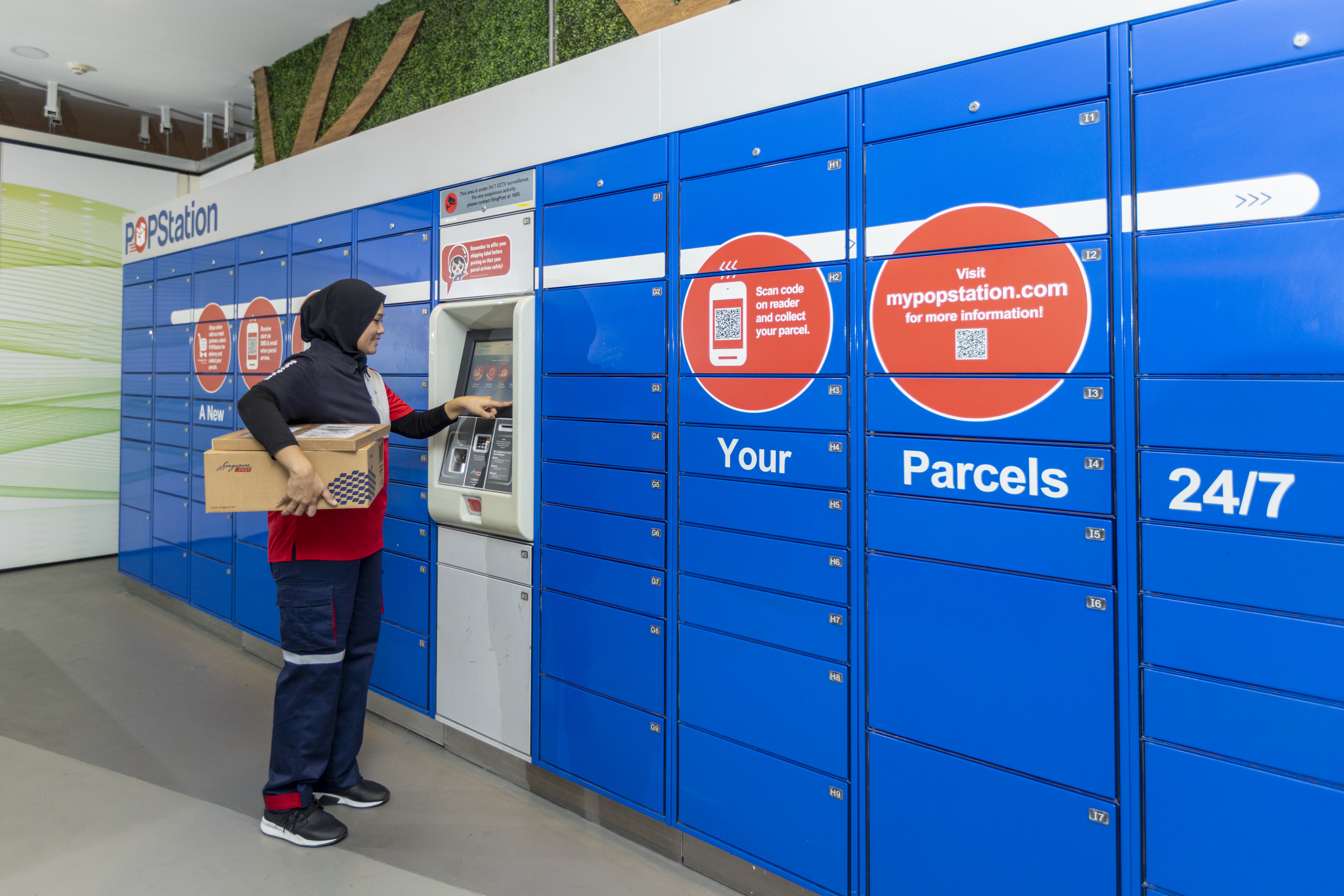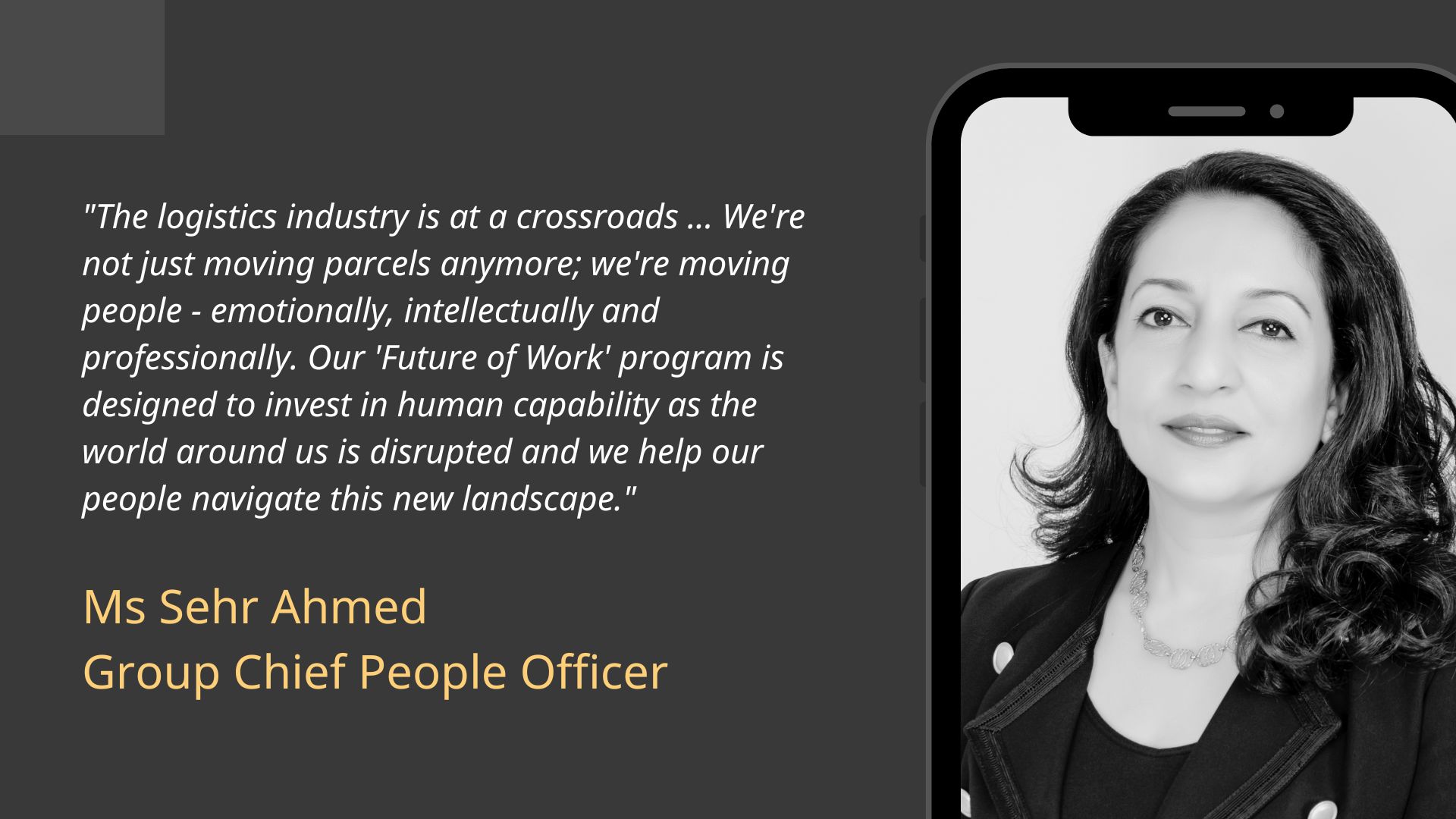
Future-Ready: Delivering SingPost's Cultural Evolution with our Future of Work Academy
This article is part of a series of interviews with SingPost senior leaders on the 'Future of Work' - an initiative within the Group designed to support its transformation into a technology-driven logistics enterprise. The 'Future of Work' initiative comprises a focus on employee upskilling through its Future of Work Academy, digital and automation Centres of Excellence (CoEs) and, through a partnership with Google, an Innovation Lab. This series captures the views and vision of business leaders driving change through the organisation.
SINGAPORE — In the heart of Singapore's bustling logistics sector, Singapore Post (SingPost) is embarking on a journey of cultural transformation. At the helm of this change is Sehr Ahmed, who joined as Group Chief People Officer in January 2024. Sehr recently sat down to discuss SingPost's new "Future of Work" program and the company's evolving culture.
"The logistics industry is at a crossroads," Sehr pauses to reflect. "We're not just moving parcels anymore; we're moving people - emotionally, intellectually and professionally. Our 'Future of Work' program is designed to invest in human capability as the world around us is disrupted and we help our people navigate this new landscape."
The program, Sehr explains, is built on SingPost's purpose of "Making Every Delivery Count for People and Planet" and six core values: Trust, Total Customer, Safety, One Team, Top Execution, and Transformation. These principles underpin SingPost's ambitious culture transformation; they are not only corporate speak.
At SingPost, Sehr says, " We walk the talk, keeping our word is the essence of trust. We say what we mean and do what we say, both to our customers and to each other." This trust-based approach aligns with recent research from Deloitte, which found that 94% of executives and 88% of employees believe a distinct workplace culture is important to business success1.
The Total Customer value puts the customer at the heart of SingPost's operations. "We're committed to listening to our customers, understanding their needs, and providing them with our full range of value-adding and innovative services," Sehr says.
Safety; physical and psychological, is another cornerstone of SingPost's cultural transformation. "We've created an environment where employees feel safe to voice workplace concerns or ideas for improvement," Sehr explains. This focus on psychological safety echoes the work of organisational behaviour expert Amy Edmondson, who has shown that psychological safety and accountability create “high-performance zones2”. Psychological safety is a shared belief held by members of a team that ‘it’s OK to take risks, to express ideas and concerns, to speak up with questions, and to admit mistakes, all without fear of negative consequences. It is a felt “permission for candour” and considered crucial for team learning, innovation and performance.
Underlying SingPost's initiatives to dismantle silos and promote teamwork within the company is the One Team concept. No department has all the answers in the complicated logistics environment of today, notes Sehr. She says, "We need to leverage our collective expertise and ensure everyone is empowered to perform at their best."
Top Execution is about making execution SingPost's strength. "We follow lean processes, are accountable to our stakeholders, and strive to be proactive and responsive," Sehr notes. "It's about constantly looking for ways to do things better and keep productivity high."

A key component of the "Future of Work" initiative is the launch of the Future of Work academy, which aligns closely with SingPost's value of Transformation. "This academy will be crucial in equipping our workforce with the digital and leadership skills needed in today's rapidly evolving logistics landscape," Sehr explains. "It's not just about learning new technologies; it's about building leaders who foster a growth mindset of continuous learning, and adaptation."
This emphasis on transformation is timely. A recent McKinsey report3 highlights that organisations undergoing digital transformation often struggle with cultural adaptation. It's not without difficulties, as Sehr quickly notes, this cultural shift. "It takes diligent work and attention to transform a 165-year old postal company to keep pace with the needs of our customers in a modern international logistics marketplace," she acknowledges. "We need to think creatively and innovatively at all times."
A proof point of this dedication is the company's sponsorship of the Great Place to Work initiative globally. In Singapore, Hong Kong, Australia, and Taiwan, the company has been accredited as a Great Place to Work. Sehr says the survey is only the start. "We've held seminars and done a thorough analysis of the findings to identify and distil the relevant issues that need to be addressed," she says. "Our efforts at cultural transformation are focused and successful because of this data-driven approach."
There have been insightful discussions at these seminars too. "We've found important areas that need work, such as improving communication across departments and offering more chances for professional growth," Sehr says. "These results are directly informing our 'Future of Work' initiatives, including the curriculum for our academy."
Sehr muses over the path ahead as our talk comes to an end. "Our 'Future of Work' programme is about leading change, not merely adjusting to it," she explains. "We're not only getting ready for the future of logistics - we're shaping it by firmly establishing our transformation in these fundamental principles and co-creating it with our team members by listening to their input and feedback."
In a world where employees increasingly seek meaning and satisfaction in their work, SingPost's approach recognises that successful digital transformation isn't just about technology - it's about people, culture, and values. As the logistics industry continues to evolve, SingPost's cultural transformation, bolstered by its Future of Work Academy and data-driven approach to employee feedback, may well be its most important delivery yet.
1 Deloitte. (2016). "Global Human Capital Trends 2016: The New Organization - Different by Design."
3 McKinsey & Company. (2020). "The Next Normal: How Companies and Leaders Can Reset for Growth Beyond Coronavirus."
Stay connected on upcoming industry trends with us here!











